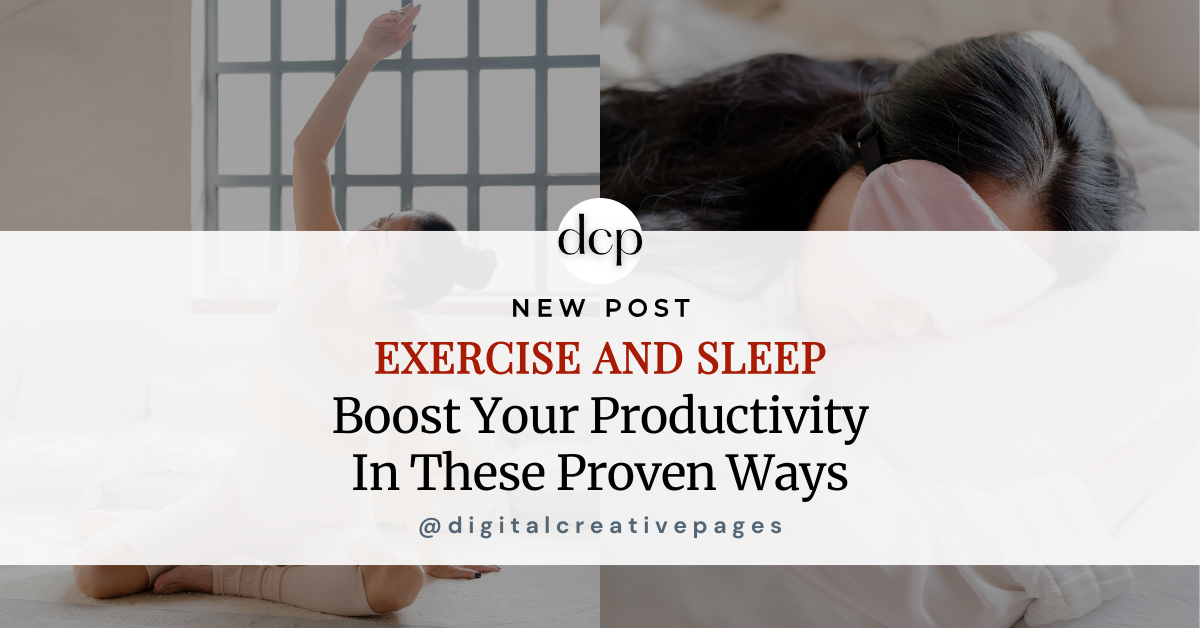Introduction
Have you ever wondered why some days you’re a whirlwind of creativity and productivity, while other days you’re stuck in a mental fog? A big part of the answer lies in two simple yet powerful habits: exercise and sleep. These two elements are like the secret sauce for unlocking your full potential. By the time you finish reading this blog post, you’ll not only understand the science behind it but also have actionable tips to integrate exercise and sleep into your routine to maximize creativity and productivity.
Save this for later

How Exercise Boosts Creativity and Productivity
When you think about exercise, you probably imagine building muscles or losing weight. But did you know it’s also a fantastic way to give your brain a workout? Regular physical activity doesn’t just keep your body healthy—it has a profound impact on your mental well-being and cognitive functions.
Here’s why exercise is a game-changer for creativity and productivity:
- Enhances Brain Function: Exercise increases blood flow to the brain, delivering more oxygen and nutrients. This boosts your brain’s performance, improving memory, focus, and problem-solving skills—all crucial for productivity.
- Reduces Stress: Physical activity triggers the release of endorphins, your brain’s “happy hormones,” which help reduce stress and anxiety. A less stressed brain is a more creative one.
- Improves Mood: A good workout can elevate your mood, making you more open to new ideas and challenges. Positive emotions are directly linked to better creativity.
- Stimulates Neurogenesis: Exercise encourages the growth of new brain cells in the hippocampus, the region responsible for learning and memory.
- Facilitates Divergent Thinking: Physical activity, especially aerobic exercises like jogging or dancing, can enhance divergent thinking—the ability to come up with multiple solutions to a problem.
- Boosts Energy Levels: It may sound counterintuitive, but expending energy through exercise actually gives you more energy throughout the day, preventing mid-afternoon slumps.
- Sharpens Mental Clarity: Regular movement—especially activities like walking, yoga, or strength training—helps reduce brain fog and improve cognitive function. If you’ve ever felt sluggish in the afternoon, a short movement break can instantly improve focus and mental sharpness.
- Encourages Mental Breaks: Stepping away from your desk for a quick walk or a gym session can provide the mental reset you need to return to work with fresh ideas.
- Improves Sleep Quality: Regular exercise helps regulate your sleep-wake cycle, leading to better rest (more on this later).
Quick Tips for Incorporating Exercise:
- Start small: Aim for 20-30 minutes of moderate exercise daily.
- Mix it up: Combine cardio, strength training, and flexibility exercises.
- Make it fun: Choose activities you enjoy, like dancing, hiking, or swimming.
- Use breaks wisely: Take a brisk walk during lunch or between meetings.
- Use movement for brainstorming: If you’re stuck on a creative problem, take a walk. Studies show that walking—whether indoors or outdoors—enhances creative thinking. Many successful entrepreneurs and writers use this technique to generate new ideas.
Pro Tip: If you’re short on time, try High-Intensity Interval Training (HIIT). A 15-minute HIIT session can be as effective as 30 minutes of moderate exercise.
The Role of Sleep in Creativity and Productivity
Sleep is often the first thing we sacrifice when life gets busy. But skipping sleep is like trying to run a marathon without water—it’s unsustainable and counterproductive. Quality sleep is essential for cognitive functions, emotional balance, and overall well-being.
Here’s how sleep supercharges your brain and work output:
- Enhances Memory and Learning: During sleep, your brain consolidates information from the day, making it easier to recall facts and skills when you need them.
- Fosters Creative Problem-Solving: The REM (Rapid Eye Movement) stage of sleep is when your brain makes unique connections between ideas. This is why “sleeping on it” often leads to creative breakthroughs.
- Improves Focus: A well-rested brain is more attentive and less prone to distractions, helping you stay productive for longer periods.
- Regulates Emotions: Lack of sleep can make you irritable and less resilient to stress, negatively impacting your productivity and creativity.
- Boosts Decision-Making Skills: Sleep restores the prefrontal cortex, the part of your brain responsible for logical thinking and decision-making.
- Supports Hormonal Balance: Sleep regulates essential hormones like cortisol (stress hormone) and serotonin (mood stabilizer). When these hormones are balanced, you’re less likely to experience mood swings, fatigue, or mental blocks that hinder productivity.
- Detoxifies the Brain: While you sleep, your brain clears out toxins that accumulate during the day, allowing you to wake up refreshed.
- Supports Physical Health: Sleep aids in muscle recovery, immune function, and hormone regulation, all of which contribute to sustained energy levels.
- Prevents Burnout: Chronic sleep deprivation can lead to burnout, making it harder to think clearly or stay motivated.
Quick Tips for Better Sleep:
- Stick to a schedule: Go to bed and wake up at the same time every day.
- Create a bedtime ritual: Read, meditate, or listen to calming music to signal your body that it’s time to wind down.
- Limit screen time: Avoid screens at least an hour before bed to reduce blue light exposure.
- Optimize your environment: Keep your bedroom cool, dark, and quiet.
- Limit Caffeine Intake: Avoid caffeine at least six hours before bedtime, as it can interfere with deep sleep. If you need an afternoon pick-me-up, try herbal tea or a short walk instead.
Pro Tip: If you have trouble falling asleep, try progressive muscle relaxation. Tense and release each muscle group, starting from your toes and working your way up.
The Synergy Between Exercise and Sleep
Here’s where it gets even more exciting: exercise and sleep are a dynamic duo. When you exercise regularly, you’re more likely to sleep better. And when you’re well-rested, you have the energy and motivation to stay active. This positive cycle amplifies your creativity and productivity.
Why this synergy works:
- Exercise Improves Sleep Quality: Physical activity reduces insomnia and increases deep sleep, which is the most restorative phase.
- Sleep Boosts Exercise Performance: A well-rested body can exercise more effectively, enhancing your fitness gains.
- Both Combat Stress: Exercise and sleep are powerful stress-busters, keeping your mind calm and focused.
- Increases Mental Resilience: Engaging in regular physical activity and maintaining a consistent sleep schedule strengthens your ability to handle stress. A well-rested and active body is more adaptable to challenges, preventing burnout and creative blocks.
- Enhances Brain Plasticity: Together, exercise and sleep promote neuroplasticity, the brain’s ability to adapt and grow, which is essential for creativity.
- Improves Mood and Motivation: The feel-good hormones from exercise, combined with the emotional balance from good sleep, create a stable mood ideal for productivity.
- Sustains Energy Levels: Exercise provides a quick energy boost, while sleep ensures long-term energy reserves.
- Strengthens Immune Function: Both habits enhance your immune system, reducing sick days and keeping you on track.
- Encourages Routine: Incorporating both into your daily life establishes a rhythm that aligns with your body’s natural circadian cycles.
Quick Tips for Combining Exercise and Sleep:
- Exercise earlier in the day: Evening workouts can disrupt your sleep if done too close to bedtime.
- Prioritize consistency: Regularity in both habits is key to seeing benefits.
- Listen to your body: If you’re too tired to exercise, opt for light activities like yoga or stretching.
Pro Tip: Use exercise as a natural alarm clock. A morning workout not only jumpstarts your day but also helps set your internal clock for better sleep at night.
Practical Steps to Build a Routine
Making exercise and sleep a priority might seem daunting, especially if your schedule is already packed. But small, consistent changes can lead to significant results over time.
Here’s a step-by-step guide:
- Assess Your Current Habits: Keep a journal for a week to track your sleep patterns and physical activity.
- Set Realistic Goals: Start with achievable targets, like exercising three times a week or going to bed 15 minutes earlier.
- Create a Schedule: Block out time for exercise and sleep, just like you would for meetings or appointments.
- Find Accountability: Partner with a friend, join a class, or use fitness apps to stay motivated.
- Track Your Progress: Use a fitness tracker, journal, or app to log your workouts and sleep patterns. Seeing your progress over time can keep you motivated and help you make necessary adjustments.
- Celebrate Small Wins: Reward yourself for sticking to your routine. Positive reinforcement makes habits stick.
- Adjust as Needed: Life happens. Be flexible and adapt your routine without guilt.
Pro Tip: Combine activities to save time. For example, listen to an educational podcast while jogging or do breathing exercises before bed to wind down.
Final Thoughts
Exercise and sleep aren’t just “nice-to-haves”—they’re non-negotiable for anyone looking to boost creativity and productivity. By making these habits a regular part of your life, you’re investing in your mental clarity, emotional balance, and overall health. Start small, stay consistent, and watch as your creative and productive potential soars.
MY TOP POSTS
- 15 Small Business Ideas To make You Rich
- Social Media Marketing That Will Make Your Business Soar
- 6 Free Sites For Aesthetic Pictures For Your Blog
- Earn Money In Digital Marketing With No Experience
- SEO Keywords 101 – How To Find Power Words Now
- Blog Post Ideas That Will Attract Your Audience
- Pinterest Affiliate Marketing – That Will Turn Pins Into Money
Stay connected outside my social media with my weekly Newsletter – Digital Content Pages
My introducer post – check out why I chose Showit as my website builder here
Use my code DCP to get one 1.5 months free on Showit
Get all the resources for your social media and digital marketing without breaking the bank from my DCP Shop here
Pin this for later

By signing up for my freebies, you are agreeing that I can use your email address to market to you. You can unsubscribe from marketing emails at any time by using the link in my emails.
Previous post
next post
Search + Enter
meet nila
Hi. I am
Nila
Beta reader, book editor, Pinterest manager, Showit VA
I’m a beta reader and book editor and PA for authors, specializing in story clarity and developmental feedback. I run a sustainable online business that keeps working for me 24/7.
Along with this, I offer Pinterest management for overwhelmed creatives and entrepreneurs and set up and customize Showit templates when the tech side gets too overwhelming.
My Shop
Buy now
i need it
Free Stuff
get the goods
check it out
My Favorites
apps + Tools
Yes, please
Handpicked Links
Excited to get started? Me too!
i can't wait to
Connect with you
Let's discuss how best I can help you and your business
find your way around
about
for authors
Showit
shop
Blog
freebies
Contact
elsewhere
X
Copyright © 2024 - 2026 Digital Creative Pages | All Rights Reserved | Terms & Conditions | Privacy Policy
Website Template by Digital Creative Pages.
Photos by Styled Stock Society
Subscribe here for weekly Canva & Social Media tips and 10% off in my shop
